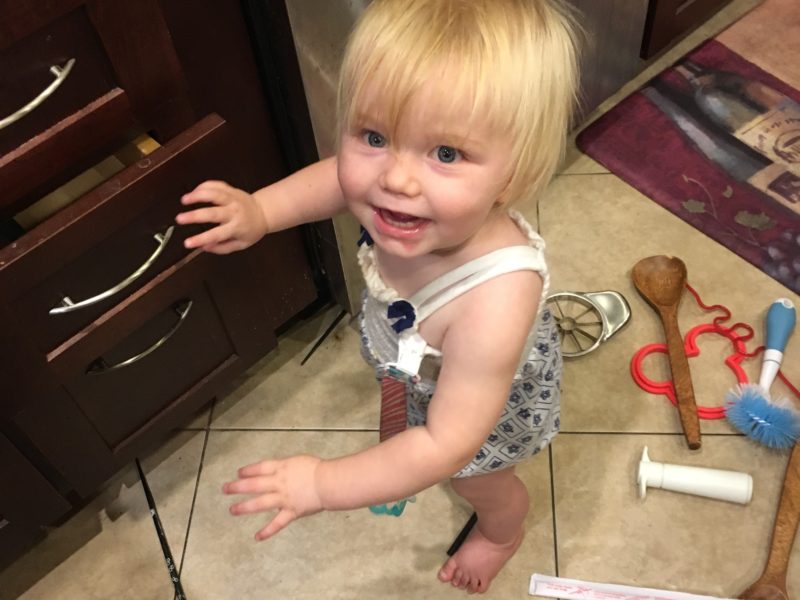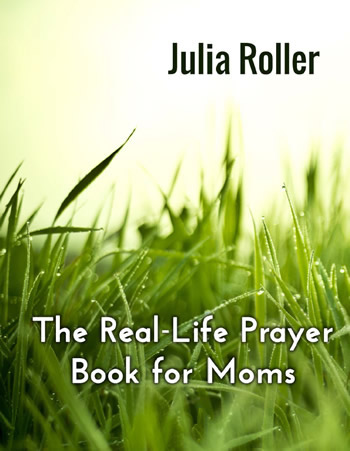My daughter is 15 months old. What that means for my house is that there is no safe place to keep the toilet brush. That as I put the dirty dishes into the dishwasher, she is joyfully unloading them on the other side. And that she empties all the kitchen cabinets she can reach every time I cook dinner, and does the same to the bathroom cabinets while I take a shower or brush my teeth.
At least once a day I ask myself: Should I put all these things back into the cabinet for the fifth time or do I just give up now and leave them on the floor?
This age is an extreme example of what can be a challenging part of being a parent: the way our hard work often seems to be immediately negated. The dishes always get dirty again, the clean clothes get worn and end up back in the hamper, the counter sprouts more crumbs, and the beds are always getting un-made.
Parenting is filled with repetitive tasks. Sometimes it’s hard to see the point of all of this cleaning and dirtying, making and un-making, especially in a spiritual sense. I find that I struggle with this feeling especially in the shortened days and colder weather of the winter season. As I go outside to the washing machine in our garage and reflect again on the unending nature of the laundry, I also start to wonder if I’m doing it wrong. After being a parent for more than ten years, why am I still spending so much time on all this household stuff? Shouldn’t I be better/ faster/ more efficient? Have I just not yet happened upon the right Pin or “life hack”?
When I get stuck feeling this way, I have to remind myself that these endless-feeling daily tasks—the laundry, the dishes, the cleaning up—are not just the things that get in the way of my real life. They are my real life.
I remember some of the profound things one of my favorite writers, Kathleen Norris, has to say about these repetitive tasks. It is these very tasks that remind us of the important fact that God made us with bodies, bodies that need to be fed, washed, and clothed. Caring for these needs is of importance because our bodies are important. Jesus’ death on the cross showed us that.
Not only are these daily tasks meaningful, they can also provide time for prayer and contemplation. In fact, Norris sees laundry in particular as an opportunity for contemplation. She writes, “There are days when it seems a miracle to be able to make dirty things clean” (The Quotidian Mysteries, p. 15). Frankly, that’s a lot better washing machine reflection than my usual, which is why I cannot seem to teach my boys to take their socks off right side out.
What if these repetitive tasks, tasks that leave our minds free to think about other things, are times God has given us to pray?
I know showers and walks have always been times where I find myself talking to God, times where I don’t have to think about what I’m doing and where I have a little break from the noise of the rest of the world. There’s no reason I can’t bring the same focus to the picking up, the dishwashing and the laundry too.
Here’s my challenge to myself and to you: Recognize these times as prayer interludes. Resist the urge to turn on the radio or podcast or TV every time you approach the sink. Pray for your temper and your sanity if you need to; thank God for your children; pray for wisdom and guidance as you raise them; pray for them and their hearts; pray for your spouse. Pray for whatever the Spirit calls you to.
I know one of the biggest challenges to doing this sort of thing is the feeling that we simply don’t have time for it. To this feeling Norris also has an answer. She writes, “The often heard lament, ‘I have so little time,’ gives the lie to the delusion that the daily is of little significance” (p. 16). In other words, when we complain about how little time we have, what we’re really saying is that the things we’re filling our days with don’t feel important enough.
This insight rings particularly true to me as a parent. So the next time my little girl gleefully empties out a cupboard, I can respond in a couple of ways. I can sit down with her and clap with her as I show her how fun it is put everything back! Remembering that at that moment, doing that very thing is the most important task to which I am called.
Or I can come back to it later and recognize the time the task takes as an opportunity to pray for her and for my other two children. And think of these interludes as the pieces that anchor my day rather than interrupt it.
Speaking of prayer–I’ve got to go; there’s a Tupperware collection scattered across my kitchen floor.
For everything there is a season,
and a time for every matter under heaven.
Ecclesiastes 3:1
This post first appeared on www.1corinthians13parenting.com.



